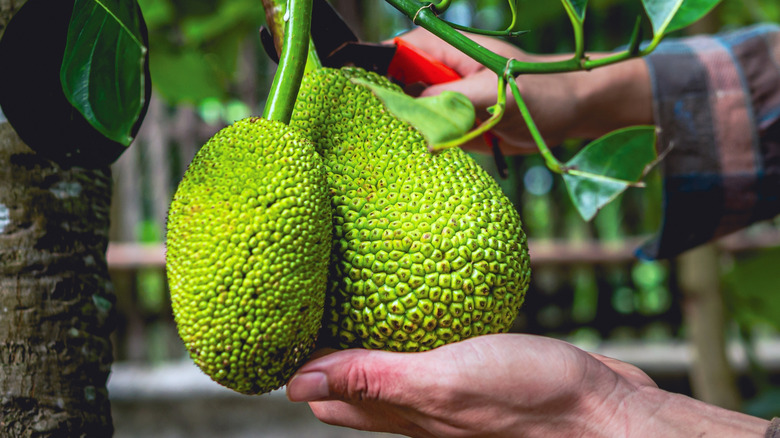A High-Protein Fruit That Tastes Like Meat Can Help Lower Blood Pressure
Having high blood pressure doesn't just put you at risk for a heart attack or stroke. It can also leave you struggling with other symptoms, including kidney disease, eye problems, and even sexual health and performance difficulties. But if you're one of the estimated 119.9 million adults living with hypertension (elevated blood pressure) in the United States, you may be able to use food to help control your condition.
In fact, some people with high blood pressure have found that they can bring their systolic and diastolic numbers to normal levels without medication. As a 2023 review in Cureus concluded, consuming foods that aligned with the antihypertensive Dietary Approach to Stop Hypertension (DASH) diet plan (e.g., those that were high in potassium, fiber, protein, and magnesium) could lower blood pressure levels.
The good news is that you don't have to look far to find foods offering such traits. One such food is jackfruit, a tropical fruit that's becoming increasingly popular, especially among vegetarians and vegans. Though it's traditionally sweet when ripe, its texture and taste are much different when it's unripe: its flesh has a meat-type consistency and is relatively neutral in flavor.
How the protein and potassium in jackfruit can help with your blood pressure levels
If this sounds a little like the description for pulled pork, chicken, or beef, you're right. Many cooks use unripened jackfruit as a meat subsitute in their savory tacos or burritos, barbeque, and stews.
A one-cup serving of raw jackfruit provides you with 2.6 grams of protein. Though that isn't nearly as much protein as you'd get from a cup of canned chicken, it's still more protein than you might expect to find in a fruit. Moreover, other fruits that are surprisingly high in protein (like guava and kiwi) aren't useful as meat alternatives.
While getting protein from jackfruit is exciting, it's the fruit's other nutrients that can decrease your blood pressure numbers. You'll net 676 milligrams of potassium, 2.26 grams of fiber, and 43.8 milligrams of magnesium in each cup of jackfruit you eat. As a 2019 review in the International Journal of Food Science explained, jackfruit's high concentration of potassium makes it a beneficial, antihypertensive food.
Fiber rounds out jackfruit's cardiovascular benefits
Jackfruit's fiber content may also contribute to its heart-healthy aspects. A 2024 review in Hypertension noted that increasing daily fiber by merely 5 grams could produce a modest but measurable decrease in both systolic and diastolic blood pressure results: 2.8 and 2.1 millimeters of mercury (mmHg), respectively.
There's little argument that jackfruit could be worth a second look if you're fighting against hypertension, particularly if you like versatile foods that have multiple uses. Depending upon whether you purchase jackfruit in its early or late stages, you can eat it as part of a main dish or as a dessert. That said, if you want to get the most blood pressure-lowering impact from jackfruit, you may want to stick with the young, unripe fruit that's best served instead of meat. The sweeter, mature fruit loses some of its fiber content (along with the potency of numerous other chemical compounds), according to a 2023 study published in LWT – Food Science and Technology.
A word of warning: If you struggle with seasonal allergies to birch pollen or experience generalized allergies to latex, you may be at risk of having a physical reaction to jackfruit.



